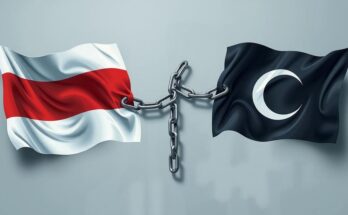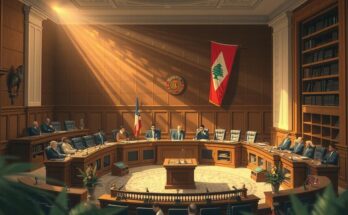South Sudan’s President Salva Kiir has removed Upper Nile governor James Odhok Oyay following escalating clashes with an ethnic militia allied to rival Riek Machar. The government’s actions have prompted arrests of SPLM-IO officials and led to fears of a return to civil war, with 50,000 people displaced. Kiir’s administration cites the need for peace in Upper Nile state as justification for Oyay’s dismissal, while SPLM-IO condemns the actions as violations of the peace agreement.
South Sudan’s President Salva Kiir has dismissed Upper Nile state governor James Odhok Oyay amid escalating violence involving government forces and ethnic militias. President Kiir attributes the clashes to the White Army militia, which he alleges is allied with his political rival, First Vice President Riek Machar. This action exacerbates ongoing tensions between Kiir and Machar, especially after the militia’s recent success in pushing back government troops from the contentious town of Nasir, located near the Ethiopian border.
Following the dismissal, several members of Machar’s Sudan People’s Liberation Movement in Opposition (SPLM-IO), including the petroleum minister and the deputy army chief, were detained by Kiir’s administration. These developments raise concerns about a potential return to conflict in the country, which is still recovering from a civil war that resulted in the death of hundreds of thousands nearly seven years ago.
In a decree broadcast on state television, President Kiir replaced Oyay, who is a member of SPLM-IO, with James Koang Chuol, a lieutenant general from Nasir. This move has sparked indignation among members of SPLM-IO, who have expressed intentions to partially withdraw from the 2018 peace agreement in response to the arrests and Oyay’s removal. Machar’s spokesperson characterized this dismissal as a significant breach of the Revitalised Peace Agreement established in 2018.
In defense of the actions taken, Information Minister Michael Makuei accused Machar’s party of undermining peace efforts, asserting that Oyay was dismissed with the aim of restoring stability in Upper Nile state. The government has alleged that the SPLM-IO maintains affiliations with the White Army, primarily composed of armed Nuer youths who allied with Machar during the earlier civil war. Despite these accusations, SPLM-IO denies any wrongdoing.
According to reports from the United Nations, the ongoing disturbances surrounding Nasir have displaced approximately 50,000 individuals since late February. The UN has issued warnings indicating that Sudan is at risk of regressing into civil war, reflecting the fragile stability that remains in the aftermath of prolonged conflict.
In conclusion, President Salva Kiir’s dismissal of Upper Nile governor James Odhok Oyay marks a significant escalation in tensions between the South Sudanese government and the SPLM-IO, underlining fears of potential renewed conflict. The government’s actions, which include the arrest of SPLM-IO officials, have led to protests and concern over the integrity of the peace agreement established in 2018. As fighting continues, with a notable displacement of thousands, the situation remains precarious and demands urgent attention from both national and international communities.
Original Source: www.straitstimes.com




